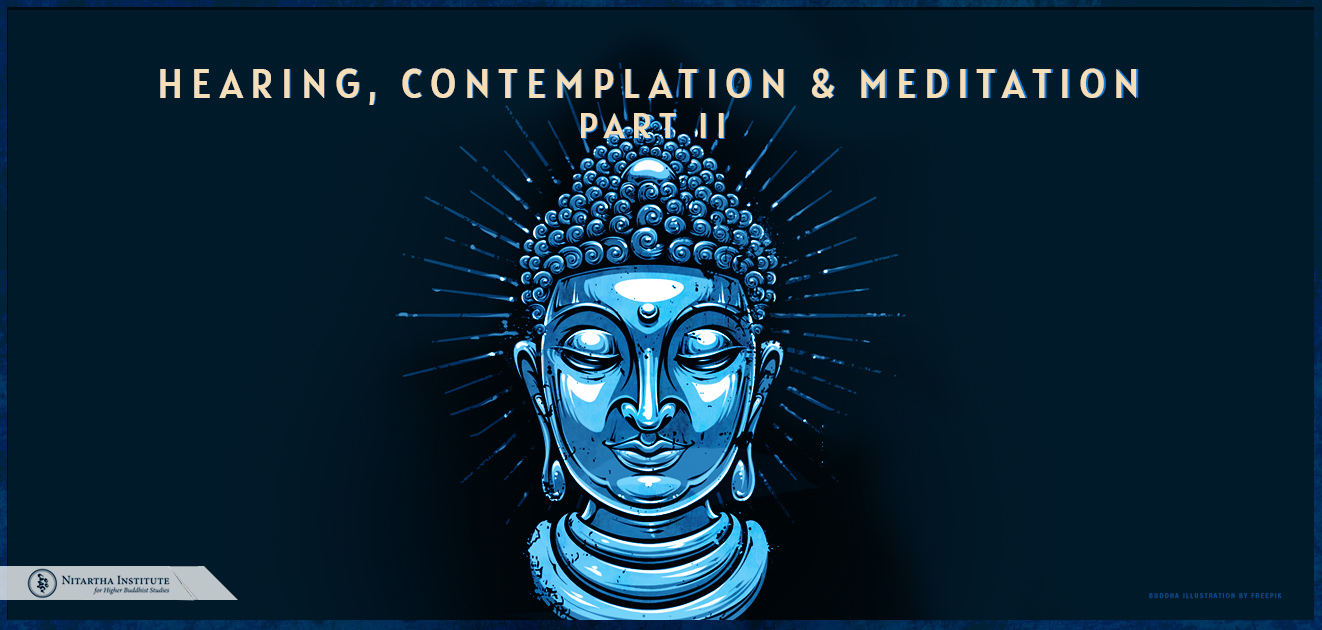This excerpt is copyrighted material, please do not use or copy without written permission from Nitartha Publications.
The following is part II of an excerpt from Commentary on Hinayana Tenets by Acharya Sherab Gyaltsen (You can read part I here). This is included in the introduction section of the sourcebook we use in our Mind & its World I course. Some things we learn about in details in the course rare:
- Divisions of mind
- Definitions of valid cognition
- Definition of direct valid cognition
- Sense direct valid cognition
- Two truths in Vaibhashika and Sautrantika view
- Process of perception in Vaibhashika and Sautrantika view
- Mental direct valid cognition
- Self-aware direct valid cognition
- Yogic direct valid cognition
- Seeming direct cognition
- Definition of inferential valid cognition for oneself and for others
- Appearing object, referent object, object of engagement
- Nonvalid cognition
- Three results of valid cognition
- …and much more
Hearing, Contemplation & Meditation II
Acharya Sherab Gyaltsen
Read part I here.
Qualities of Hearing
To illustrate the qualities of hearing, we can make the analogy of a dark house. If you have a dark house, no matter how many nice belongings and possessions you have inside, no matter how beautiful the paint is or how nice the shapes of the room are, if it is dark, when you enter the house, you are not going to be able to see any of the house or appreciate it. In the same way, as sentient beings, out mind-streams from beginningless time have been turned towards the ignorance that is deluded about the way things appear and the ignorance that is deluded about the way things are. There is a very thick darkness that exists in our mindstreams as sentient beings. Hearing the Buddha’s teachings is like turning on the light in your house. We can illuminate the darkness in our minds.
Wisdom of Hearing
The wisdom of hearing is said to be the supreme of all jewels. Worldly types of jewels or things that we may keep in our houses are subject to being stolen by thieves. But if we engage in hearing and develop the qualities and wisdom of hearing, the teachings of the Buddha will stay in our mind-streams, and no bandit, robber, or thief can ever access them. They will always stay with us once we acquire them. For this reason, hearing is said to be the supreme of all jewels.
The wisdom of hearing is also taught to be like a sword. It can conquer all enemies, just as a physical sword can conquer external enemies. The sword that is the wisdom of hearing can conquer the darkness of not knowing. Once we rely on the wisdom of hearing, we can come to correctly know what points are to be abandoned or adopted in regard to karma and the way things appear. As well, we can come to understand the points that are to be adopted or abandoned in regard to the way things are—the actual nature of things—by relying on the wisdom of hearing. Since this is the case, hearing is taught to be like a sword that can conquer all enemies.
Wisdom of Contemplation & Meditation
Of course, we cannot just stop at the wisdom we acquire from hearing. We must join the wisdom of hearing with the wisdom of contemplation. Therefore whatever we hear from our spiritual friends, it is beneficial to reflect again and again on what we have heard. It is said that hearing that is not joined to contemplation and meditation is like a rich man who is bound by his wealth. He has innumerable material possessions and wealth but cannot enjoy them. He is afraid to put on the nice clothes he has bought or eat the nice food he owns. He just wants to store it all and have it all. If one does not further apply the understanding that arises from hearing through contemplation, one is like a rich person who cannot enjoy his or her possessions.
As for contemplation, it is said that we have to contemplate in the manner of following the way of gaining certainty, not just believing what we have heard out of some kind of respect for something like that. The Buddha said that it is not appropriate for an individual to adhere to his teaching or to trust or believe in his teaching simply out of respect for the fact that he is the Buddha or that it is his command.
THREE STAGES OF ANALYSIS
The Buddha taught the three stages of analysis so that people could better give rise to certainty in the scriptures or the teachings they have heard. To present the three stages of analysis, he used that example of a gold merchant inspecting his gold. There are three stages a gold merchant goes through to inspect his gold: burning, cutting, and rubbing. The first thing a gold merchant does to test the gold is to burn it and see if it changes color in the way that gold should. Next, he rubs the gold to see if it matches up to the reaction that gold should have to rubbing. Finally he cuts the gold to see what it looks like on the inside. After thoroughly analyzing it in this way, he can be certain whether it is gold or not and whether he should keep it or throw it away. In the same way, we need to contemplate the teachings in a thorough manner. We first need to thoroughly analyze the teachings, and if, as the Buddha said, in the end they are something that you agree with, and if they concord with your reasoning, then you should put them into practice. But if they do not concord with your reasoning, you should just abandon them.
The people who hold this view are in error. They do not realize the cause and effect relationship between hearing, contemplation, and meditation. The cause of hearing bears the result of contemplation, and the cause of contemplation bears the result of meditation. You cannot have meditation without its corresponding causes, and you cannot have the result of good meditation without the corresponding causes of hearing and contemplation.
Thus those who think that hearing and contemplation are simply binding factors are also accepting that results arise without any cause.
The Buddha taught 84,000 heaps of dharma, and it is said that the dharma teachings that Buddha gave are limitless. We could ask these people, “If it is the case that meditation is all you need to do without hearing and contemplation, then why did the Buddha teach all these teachings?” It would follow that the Buddha’s 84,000 teachings of dharma would be purposeless, and so this is not the case.
Someone who meditates without hearing or contemplation is like a person who has had his or her hands cut off but wants to climb a mountain. He or she can have this great goal and vision of climbing to the top of a very steep mountain, but however much effort he or she puts into this goal, this person is not going to get anywhere. In the same way, if a person wants to meditate without having heard any teachings or contemplated any teachings, he or she might have a lot of ignorance to work with but will not have any wisdom. This person will not know what is to be meditated upon, and he or she will not be able to attain any kind of result.
This has been a brief explanation of the purpose and reasons why we engage in hearing, contemplation, and meditation.
Read part I here…
Meditation Practice
There is a nice verse that reminds us of the context and intention through which these teachings are being given to us. The verse says:
All of the great many dharma ways of the victorious One,
Infinite in their reach
Are nothing other than methods
For taming our own mind-stream.
Please contemplate this verse well. Remember it and memorize it.





